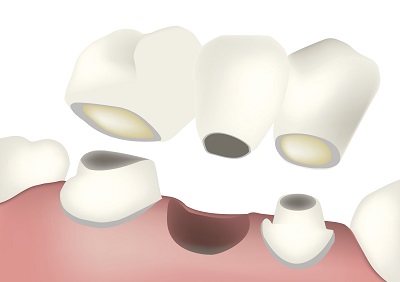When you lose a tooth, you can lose so much more than just that tooth. You can also lose your ability to smile freely and with confidence, as the gap between your teeth can be unsightly and make you feel shy or ashamed of revealing your smile. You may also lose your ability to eat without hesitation, as tooth loss can negatively impact your bite force.
It may become painful to bite and chew since your remaining teeth will be working extra hard to help make up for the missing tooth. Lastly, you may lose your ability to have a healthy and youthful-looking appearance. Tooth loss can lead to gum and bone loss, causing your face to sag and appear older than it is.
We here at Carolina Smiles Family Dentistry understand how difficult tooth loss can be for our patients, which is why we are pleased to offer dental restoration services like dental bridges to help restore both your confidence and your quality of life.
Dental Bridges

What Types Of Dental Bridges Are Available To Me?
Many of our patients are surprised to learn that there is not a one-size-fits-all approach to getting a dental bridge. Depending on how many teeth you may have lost, or the location of the space in your mouth, you may be a good candidate for one type of bridge instead of a different type.
There are four common varieties of dental bridges you may encounter in our office. The most common type is the traditional bridge, which is often made out of porcelain or porcelain-fused-to-metal. This type of dental bridge consists of two supporting crowns on either side of the pontic, which is the prosthetic tooth.
Less common types of bridges are called Maryland bridges and cantilever bridges. Cantilever bridges only use one crown for support, but it can cause strain on the surrounding teeth and are generally not recommended. Finally, Maryland bridges do not use crowns, and instead, have “wings” that are attached to the back of the surrounding teeth to support them.
Advantages Of Dental Bridges For The Long-Term
A dental bridge can be incredibly helpful to our patients. They can help restore your bite force, allowing you to eat your favorite foods again. It can help prevent your face from starting to look haggard or old, and it can improve your confidence by restoring your beautiful smile. Tooth loss can make it difficult to speak clearly, but a dental bridge can prevent issues with speech.
Tooth loss can also cause your remaining teeth to become susceptible to lose, too. If you lose a tooth, your remaining teeth may try to shift and drift into the vacated spot. This can lead to more loose teeth and, eventually, loss of your remaining teeth. A dental bridge can fill that opening, helping to preserve your teeth.
Dental bridges are a wonderful treatment option for many patients who have lost one or more teeth. If you would like to learn more about them or to set up an appointment with us here at Carolina Smiles Family Dentistry, please give us a call today at (803) 794-2273!
